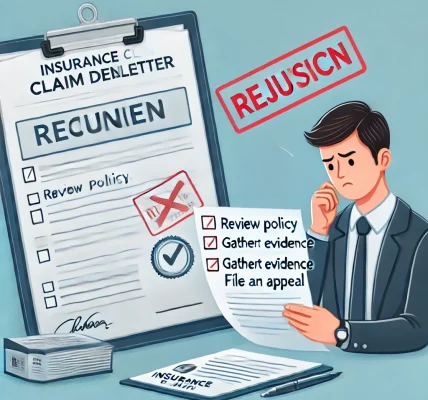Insurance claims can sometimes be denied for various reasons, leaving policyholders frustrated and unsure about their next steps. If you find yourself in such a situation, don’t panic. There are legal and practical steps you can take to challenge the denial and get the compensation you deserve. This guide will help you navigate the process effectively.
1. Understanding Why Your Claim Was Denied
Before taking any action, it’s crucial to understand why your claim was denied. Insurance companies typically provide a reason in their denial letter. Common reasons include:
- Incomplete or Incorrect Documentation: Missing information or errors in paperwork.
- Policy Exclusions: The claim falls under an exclusion listed in your policy.
- Missed Deadlines: Failure to file the claim within the stipulated time.
- Lack of Sufficient Evidence: Insufficient proof of damages or loss.
- Premium Lapses: Unpaid premiums leading to policy cancellation.
- Discrepancies in Statements: Inconsistent information between your claim and submitted documents.
Understanding the exact reason for denial will help you determine the best course of action.
2. Review Your Insurance Policy Thoroughly
Carefully go through your insurance policy to:
- Verify if your claim is covered under the policy.
- Check for any exclusions that might apply.
- Confirm deadlines for filing appeals or reconsiderations.
- Understand the insurer’s dispute resolution process.
Highlight any sections that contradict the denial reason provided by your insurer.
3. Contact Your Insurance Company
After reviewing your policy, call or email your insurer to:
- Get clarification on the denial reason.
- Request a detailed explanation in writing.
- Ask about possible reconsideration or corrections needed.
- Inquire about the appeal process.
Maintain a record of all communication, including emails, letters, and phone call details.
4. Gather Additional Evidence
If your claim was denied due to insufficient proof, strengthen your case by collecting additional supporting documents such as:
- Photographs & Videos: Clear images of damage or loss.
- Receipts & Invoices: Proof of expenses related to the claim.
- Medical Reports (for health claims): Detailed diagnosis and treatment records.
- Expert Assessments: Reports from professionals like mechanics, doctors, or contractors.
- Witness Statements: Statements from people who can verify the claim.
5. File a Formal Appeal
Most insurance companies allow policyholders to appeal a denied claim. Follow these steps:
- Write a Strong Appeal Letter: Clearly state why you believe the denial was incorrect. Attach supporting documents.
- Meet Submission Deadlines: Ensure your appeal is filed within the timeframe specified in your policy.
- Request an Internal Review: Ask for a senior claims adjuster to reassess your case.
6. Seek Assistance from a Consumer Protection Agency
If your appeal is unsuccessful, consider reaching out to organizations like:
- Insurance Ombudsman: A neutral body that helps resolve disputes between policyholders and insurers.
- State Insurance Regulatory Authorities: Government agencies that oversee insurance companies’ practices.
- Consumer Protection Groups: Non-profits that assist individuals facing unfair claim denials.
7. Consider Hiring a Lawyer
If all else fails, consulting an attorney specializing in insurance disputes may be your best option. A legal expert can:
- Assess whether the insurer acted in bad faith.
- Guide you on the best legal course of action.
- Represent you in negotiations or court if necessary.
8. File a Complaint Against the Insurer
If you suspect wrongful denial, you can file a complaint with:
- The Insurance Regulatory Authority in your country
- A consumer grievance forum or court
- A legal tribunal specializing in insurance disputes
9. Prevent Future Claim Denials
To avoid facing another denial in the future, consider these best practices:
- Read Your Policy Carefully Before Purchasing
- File Claims Promptly and Accurately
- Keep Comprehensive Records of All Transactions and Communications
- Follow Up Regularly on Claim Progress
10. Conclusion
Having an insurance claim denied can be frustrating, but knowing your rights and taking the correct steps can help you fight back. Start by understanding the reason for the denial, gathering necessary documents, and filing an appeal. If needed, escalate the matter through regulatory agencies or legal channels. With persistence and the right approach, you can improve your chances of a successful claim resolution.



